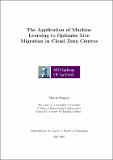| dc.contributor.advisor | Howley, Enda | |
| dc.contributor.advisor | Barrett, Enda | |
| dc.contributor.advisor | Duggan, Jim | |
| dc.contributor.author | Duggan, Martin | |
| dc.date.accessioned | 2019-08-06T13:14:24Z | |
| dc.date.available | 2019-08-06T13:14:24Z | |
| dc.date.issued | 2019-08-06 | |
| dc.identifier.uri | http://hdl.handle.net/10379/15310 | |
| dc.description.abstract | Cloud computing providers utilise large-scale data centres to provide computing resource to users’ worldwide. However, an ongoing challenge facing cloud providers is to ensure that the required resource is available to users at all times. This problem is compounded further by the fact that resource consumption is in a constant state of flux. One approach leveraged to improve resource availability for users is `Live Migration'. This thesis presents a number of novel intelligent live migration solutions, by applying machine learning to improve the performance of a data centre.
The first contribution utilises a control algorithm known as `Reinforcement Learning' to decide which virtual machines to migrate, based on RAM size when peak traffic condition is occurring and bandwidth availability is fluctuating. A Reinforcement Learning agent is implemented to decide which virtual machines to migrate from over-utilised hosts depending on currently available bandwidth and the host machine CPU utilisation.
The second contribution utilises the power of Neural Networks to predict when a host will become over-utilised. A `Recurrent Neural Network' is implemented, trained with both traditional training algorithms (Back-Propagation and Back-Propagation-Through-Time) and evolutionary algorithms (Particle Swarm Optimisation, Covariance Matrix Adaptation and Differential Evolution) to best predict CPU utilisation of a host for a single and multiple time steps into the future.
The final contribution implements a `Recurrent Neural Network' to predict both CPU of a host and bandwidth availability between host to decide optimal times to schedule live migration within a data centre. The Recurrent Neural Network predicts first if a host will become over-utilised and secondly predicts the available bandwidth before that host becomes over-utilised to best decided what times to migrate virtual machines.
The work presented in this Thesis demonstrates how Artificial Intelligence and Machine Learning algorithms can have a positive impact on live migration in cloud data centres. | en_IE |
| dc.publisher | NUI Galway | |
| dc.rights | Attribution-NonCommercial-NoDerivs 3.0 Ireland | |
| dc.rights.uri | https://creativecommons.org/licenses/by-nc-nd/3.0/ie/ | |
| dc.subject | Cloud Computing | en_IE |
| dc.subject | Machine Learning | en_IE |
| dc.subject | Artificial Intelligence | en_IE |
| dc.subject | Neural Networks | en_IE |
| dc.subject | Reinforcement Learning | en_IE |
| dc.subject | Engineering and Informatics | en_IE |
| dc.subject | Information technology | |
| dc.title | The application of machine learning to optimise live migration in cloud data centres | en_IE |
| dc.type | Thesis | en |
| dc.contributor.funder | College of Engineering and Informatics, National University of Ireland, Galway | en_IE |
| dc.local.note | This Thesis examines the usefulness of Machine Learning in the area of Cloud Computing to improve system performance and to reduce energy consumption | en_IE |
| dc.local.final | Yes | en_IE |
| nui.item.downloads | 372 | |


